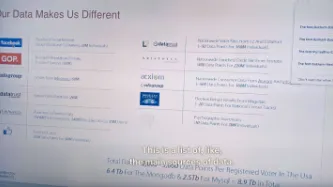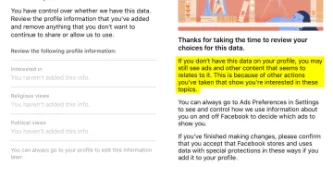Search
Content type: Long Read
A new study by Privacy International reveals how popular websites about depression in France, Germany and the UK share user data with advertisers, data brokers and large tech companies, while some depression test websites leak answers and test results with third parties. The findings raise serious concerns about compliance with European data protection and privacy laws.
This article is part of a research led by Privacy International on mental health websites and tracking. Read our…
Content type: Advocacy
Dear Chair and Committee colleagues,
Privacy International is an international NGO, based in London, which works with partners around the world to challenge state and corporate surveillance and data exploitation. As part of our work, we have a dedicated programme “Defending Democracy and Dissent” where we advocate for limits on data exploitation throughout the electoral cycle.
We have been closely following the important work of the Committee. Prompted by the additional evidence provided…
Content type: Long Read
image from portal gda (cc)
Many people are still confused by what is 5G and what it means for them. With cities like London, New York or San Francisco now plastered with ads, talks about national security, and the deployment of 5G protocols being treated like an arms race, what happens to our privacy and security?
5G is the next generation of mobile networks, which is meant to be an evolution of the current 4G protocols that mobile providers have deployed over the last decade, and there are…
Content type: Long Read
Photo by David Werbrouck on Unsplash
This is an ongoing series about the ways in which those searching for abortion information and procedures are being traced and tracked online. This work is part of a broader programme of work aimed at safeguarding the dignity of people by challenging current power dynamics, and redefining our relationship with governments, companies, and within our own communities. As an enabling right, privacy plays an important role in supporting the exercise of…
Content type: Long Read
By Valentina Pavel, PI Mozilla-Ford Fellow, 2018-2019
Our digital environment is changing, fast. Nobody knows exactly what it’ll look like in five to ten years’ time, but we know that how we produce and share our data will change where we end up. We have to decide how to protect, enhance, and preserve our rights in a world where technology is everywhere and data is generated by every action. Key battles will be fought over who can access our data and how they may use it. It’s time to take…
Content type: Long Read
Image courtesy of Michael Coghlan
The long-speculated Facebook cryptocurrency is finally here! Libra!
Libra Association, an entity co-founded by Facebook, has announced the creation of a new cryptocurrency, Libra, "a simple global currency and financial infrastructure that empowers billions of people".
The white paper that outlines the rationale for the new currency makes a number of heady statements, some which anyone who cares about rights should commend -- and some which should…
Content type: News & Analysis
Photo by Mike MacKenzie (via www.vpnsrus.com)
Ever, a cloud storage app, is an example of how facial recognition technology can be developed in ways people do not expect and can risk amplifying discrimination.
Ever is a cloud storage app that brands itself as “helping you capture and rediscover your life’s memories,” including by uploading and storing personal photos; Ever does not advertise that it uses the millions of photos people upload to train its facial recognition software,…
Content type: Long Read
Image Source: "Voting Key" by CreditDebitPro is licensed under CC BY 2.0
Democratic society is under threat from a range of players exploiting our data in ways which are often hidden and unaccountable. These actors are manifold: traditional political parties (from the whole political spectrum), organisations or individuals pushing particular political agendas, foreign actors aiming at interfering with national democratic processes, and the industries that provide products that …
Content type: News & Analysis
The first half of 2018 saw two major privacy moments: in March, the Facebook/ Cambridge Analytica scandal broke, followed in May by the EU General Data Protection Regulation ("GDPR") taking effect. The Cambridge Analytica scandal, as it has become known, grabbed the attention and outrage of the media, the public, parliamentarians and regulators around the world - demonstrating that yes, people do care about violations of their privacy and abuse of power. This scandal has been one of…
Content type: Long Read
Last week, an investigation by Bloomberg revealed that thousands of Amazon employees around the world are listening in on Amazon Echo users.
As we have been explaining across media, we believe that by using default settings and vague privacy policies which allow Amazon employees to listen in on the recordings of users’ interactions with their devices, Amazon risks deliberately deceiving its customers.
Amazon has so far been dismissive, arguing that people had the options to opt out from the…
Content type: News & Analysis
This past weekend, in an Op-Ed in the Washington Post, Mark Zuckerberg called for new regulations to address harmful content, electoral integrity, privacy and data portability.
Nine years since he proclaimed that privacy is no longer a social norm, four years since Facebook noticed broadscale harvesting and exploitation of their users' data by third party companies and chose not to tell us about it, two years since he denied there were any abuses of data in political campaigns, and…
Content type: News & Analysis
Our team wanted to see how data companies that are not used to being in the public spotlight would respond to people exercising their data rights. You have the right under the EU General Data Protection Regulation ("GDPR") to demand that companies operating in the European Union (either because they are based here or target their products or services to individuals in the EU) delete your data within one month. We wrote to seven companies and requested that they delete our data, and we've made…
Content type: Advocacy
Today, Privacy International has filed complaints against seven data brokers (Acxiom, Oracle), ad-tech companies (Criteo, Quantcast, Tapad), and credit referencing agencies (Equifax, Experian) with data protection authorities in France, Ireland, and the UK.
It’s been more than five months since the EU’s General Data Protection Regulation (GDPR) came into effect. Fundamentally, the GDPR strengthens rights of individuals with regard to the protection of their data, imposes more…
Content type: Advocacy
Today, Privacy International has filed complaints against seven data brokers (Acxiom, Oracle), ad-tech companies (Criteo, Quantcast, Tapad), and credit referencing agencies (Equifax, Experian) with data protection authorities in France, Ireland, and the UK.
It’s been more than five months since the EU’s General Data Protection Regulation (GDPR) came into effect. Fundamentally, the GDPR strengthens rights of individuals with regard to the protection of their data, imposes more…
Content type: Long Read
It’s 15:10 pm on April 18, 2018. I’m in the Privacy International office, reading a news story on the use of facial recognition in Thailand. On April 20, at 21:10, I clicked on a CNN Money Exclusive on my phone. At 11:45 on May 11, 2018, I read a story on USA Today about Facebook knowing when teen users are feeling insecure.
How do I know all of this? Because I asked an advertising company called Quantcast for all of the data they have about me.
Most people will have never heard of…
Content type: News & Analysis
Around the world, from North America to Europe and Asia, governments are starting to roll out smart meters. While the technology promises increased energy efficiency through greater consumer control over energy consumption, smart meters also raise serious privacy concerns. Smart meters collect energy usage data at high frequencies - typically every five, fifteen or 30 minutes. That level of granularity reveals how much electricity is being used in a home and when, which in turn can paint an…
Content type: Long Read
Creative Commons Photo Credit: Source
In the midst of continued widespread public outrage at the US government’s brutal ‘zero-tolerance’ policy around immigration – multiple data and analytics companies have quietly avoided answering questions about their role in feeding the US Immigration and Customs Enforcement (ICE) agency’s data backbone. These companies are bidding to work with an agency that has time and time again shown itself to be a brutal and problematic.
Privacy International…
Content type: Long Read
This piece was written by PI voluteer Natalie Chyi.
Transparency is necessary to ensure that those in power – including governments and companies – are not able to operate in the dark, away from publicscrutiny. That’s why calls for more transparency are routine by everyone from civil society and journalists to politicians.
The bigger picture is often lost when transparency is posed as the only solution to shadowy state and corporate powers. For one, the term is so broadly understood that it…
Content type: Long Read
Privacy and data protection are currently being debated more intensively than ever before. In this interview, Frederike Kaltheuner from the civil rights organisation Privacy International explains why those terms have become so fundamentally important to us. The article was first published in the newly launched magazine ROM. The interview was conducted by ROM publisher Khesrau Behroz and writers Patrick Stegemann and Milosz Paul Rosinski.
Frederike Kaltheuner, you work for Privacy…
Content type: News & Analysis
Privacy International welcomes today’s decision by the United States Supreme Court in Carpenter v. United States, which finds that the government must generally obtain a warrant when seeking mobile phone location records. In particular, PI applauds the Court’s recognition that “[m]apping a cell phone’s location over the course of 127 days provides an all-encompassing record of the holder’s whereabouts. As with GPS information, the timestamped data provides an intimate window into a person’s…
Content type: Long Read
We found the image here.
Open a Russian Matryoshka doll and you will find a smaller doll inside. Ask a large data company such as Acxiom and Oracle where they get their data from, and the answer will be from smaller data companies.
Data companies – a catch all term for data brokers, advertisers, marketers, web trackers, and more – facilitate a hidden data ecosystem that collects, generates and supplies data to wide variety of beneficiaries. The beneficiaries of the ecosystem can include other…
Content type: Long Read
If you operate an internet company in Russia, you aren’t necessarily surprised to one day open the door to someone, grasping in one hand a bundle of wires and in the other a letter from a government agency demanding access to your servers, with a black box wedged under one arm.
Internet companies in Russia are required by law to store the content of users’ communications for six months and the metadata of users’ communications for three years, essentially meaning that what a person does…
Content type: Long Read
As we said before, Facebook and Cambridge Analytica scandals are a wake-up call for policy makers. And also a global issue. People around the world are concerned by the exploitation of their data. The current lack of transparency into how companies are using people’s data is unacceptable and needs to be addressed.
There is an entire hidden ecosystem of companies harvesting and sharing personal data. From credit scoring and insurance quotations to targeted political communication, this…
Content type: Long Read
In December 2017, Privacy International published an investigation into the use of data and microtargeting during the 2017 Kenyan elections. Cambridge Analytica was one of the companies that featured as part of our investigation.
Due to the recent reporting on Cambridge Analytica and Facebook, we have seen renewed interest in this issue and our investigation. Recently in March of 2018, Channel 4 News featured a report on micro targeting during the 2017 Kenyan Presidential Elections, and the…
Content type: Long Read
The ongoing Facebook and Cambridge Analytica scandal is a wake-up call for UK policy-makers who too often encourage and promote digital industries over the protection people’s personal data. The scandal has shown that the public is concerned by companies’ exploitation of their data. The current lack of transparency into how companies are using people’s data is unacceptable and needs to be addressed.
Reform should not be limited to the behaviour of individual companies. Consumers are confronted…
Content type: News & Analysis
Written by Privacy International
07:06: Camille’s smart pillow sends a signal to her smartphone that it’s time for her to wake up. She checks the quality of sleep on the app – last night was not great. Because the pillow tracks the motion in her bed, the company knows what else she may (or may not) have been up to. But the company doesn’t just track her when she is in bed. By downloading the app, Camille has also authorised access to her location wherever she goes, her camera, her contact…
Content type: News & Analysis
This post was written by PI Policy Officer Lucy Purdon.
In 1956, US Presidential hopeful Adlai Stevenson remarked that the hardest part of any political campaign is how to win without proving you are unworthy of winning. Political campaigning has always been a messy affair and now the online space is where elections are truly won and lost. Highly targeted campaign messages and adverts flood online searches and social media feeds. Click, share, repeat; this is what political engagement looks…
Content type: Press release
Press Release: New report shows how car rental companies are failing to protect drivers' information
A new report by Privacy International shows how car rental companies and car-share schemes are failing to protect drivers' personal information, such as their location, smart phone contents, and place of residence.
The report is here: https://privacyinternational.org/node/987
Key points
Privacy International (PI) rented a series of internet-connected cars and examined the information which was collected and retained on the rental cars' infotainment system*. Every car PI rented…
Content type: News & Analysis
7 July 2017
War profiteers are finding the data business easy going. The have wielded their unwarranted influence and applied their business model of causing and then profiting from insecurity and applied it to the digital age; the results have been more profit for them and less liberty for you.
When a politician riles against an evil tech giant for providing ‘safe spaces’ online, it’s a political distraction. The real battle for your data is being fought between the emergent tech…





























